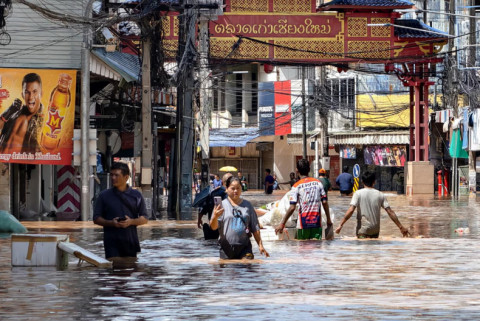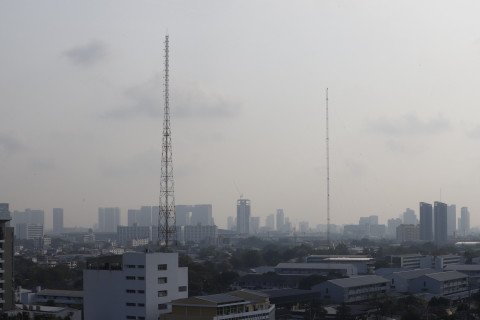Showing 1 - 10 of 14
COP30 must be more focused on human welfare
Oped, Bjorn Lomborg, Published on 13/11/2025
» With the United Nations climate summit, COP30, now in full swing in the humid jungle city of Belém, Brazil, Microsoft co-founder and philanthropist Bill Gates has cut through the noise with a blunt truth: these UN climate gatherings must zero in on lifting human lives, rather than fixating solely on slashing emissions or dialling down global temperatures. It's a perspective that's long overdue yet seems so obvious.
Thailand should chart its own path on climate
News, Bjorn Lomborg, Published on 14/06/2025
» In recent years, climate anxiety has taken over many Western governments and most international organisations. The result has been ruinous policies that help little but undermine future prosperity needed to deal with a host of other problems. Fortunately, Thailand can avoid repeating these mistakes.
Green energy has become a pricey delusion
Oped, Bjorn Lomborg, Published on 13/05/2025
» Ask families in Germany and the UK what happens when more and more supposedly cheap solar and wind power is added to the national power mix, and they can tell you by looking at their utility bills: it gets far more expensive. This goes against everything that we're being told. Green energy is supposed to be incredibly cheap. But we're not hearing the real story.
Environment on the up as world prospers
Oped, Bjorn Lomborg, Published on 22/04/2025
» As we celebrate Earth Day today, it's tempting to believe that the world is on the brink of environmental collapse. We are constantly inundated by dire predictions of climate catastrophe and warnings about the planet's imminent destruction. But this is misleading. Rather than panic, we should take a moment to appreciate the remarkable progress we've made in improving the environment -- and acknowledge that a key factor is prosperity.
Climate debate is being silenced by the UN's bias
Oped, Bjorn Lomborg, Published on 14/03/2025
» The United Nations is at a crossroads. US President Donald Trump pulled out of the World Health Organization (WHO), cut funding for the UN's Climate Convention, and more withdrawals are likely. He calls the UN an "underperformer", suggesting it is a swamp to be drained.
Pricey policies to curb climate change 'dead'
Oped, Bjorn Lomborg, Published on 28/11/2024
» The latest climate summit has been as hypocritical and dysfunctional as every one before, with most world leaders not even bothering to turn up. Still, 50,000 people flew in from across the world, while essentially telling the rest of us to stop flying. Poor-country politicians performatively staged a "walk-out", and rich nations ended up promising a climate slush fund of US$300 billion (about 10 trillion baht) a year.
Rich world raids development funds for climate
Oped, Bjorn Lomborg, Published on 27/01/2024
» Too many rich-world politicians and climate campaigners forget that much of the world remains mired in poverty and hunger. Yet, rich countries are increasingly replacing their development aid with climate spending. The World Bank, whose primary goal is to help people out of poverty, has now announced it will divert 45% of its funding toward climate change, shifting some US$40 billion annually away from poverty and hunger.
COP28 won't admit real cost of net zero
News, Bjorn Lomborg, Published on 06/12/2023
» The spectacle of another annual climate conference is getting underway in Dubai. Like Kabuki theater, performative set pieces lead from one to the other: politicians and celebrities arrive by private jets; speakers predict imminent doom; hectoring NGOs cast blame; political negotiations become fraught and inevitably go overtime; and finally: the signing of a new agreement that participants hope and pretend will make a difference.
Development goals need to be prioritised
Oped, Bjorn Lomborg, Published on 20/09/2023
» The world is failing on its development promises. These are known as the Sustainable Development Goals (SDGs), agreed by all governments in 2015 to be achieved by 2030. Progress across all these promises -- including in areas as important as eradicating poverty and ending hunger -- is happening at less than one-fourth of the pledged speed. On current trends, the world will reach its 2030 promises half a century late.
Why malaria still persists in much of Africa
News, Bjorn Lomborg, Published on 12/06/2023
» We think of malaria as a problem faced only by humid, hot countries. But just over a century ago, the disease thrived as far north as Siberia and the Arctic Circle, and was endemic in 36 states of the US. We don't have specific data that far back for Thailand, but back then, malaria is estimated to have killed 2.5 million people each year in the Western Pacific, Middle East and South Asia.










